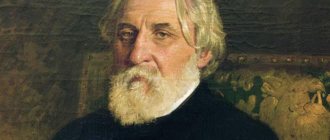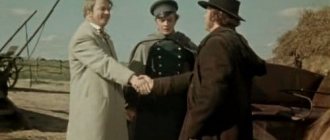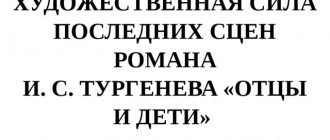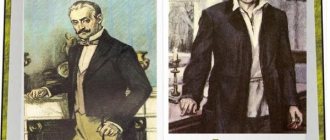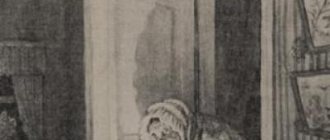The history of writing the novel
The novel “Fathers and Sons” was written in the 60s of the 19th century, when nihilistic sentiments characteristic mainly of the younger generation began to develop in Russia. Denial of old principles and foundations, unscrupulousness on the way to achieving set goals, lack of admiration for the authority of adult experienced people and a priority attitude to the useful, putting the spiritual in the background - all this draws a line between fathers and their children.
Today there is nothing new in such views and almost every generation has a certain conflict with their elders. Another thing is that at that time, which the Russian classic described, the tendency to deny everything familiar became a kind of revolution in the minds, received with a bang by many representatives of the young nobility. It is noteworthy that the events unfolded on the eve of the events of 1861, when a peasant reform was adopted that abolished serfdom.
And what about the author himself, because his attitude to the events described plays a huge role? It is wrong to judge this by some individual passages from the work, even if sympathy or, on the contrary, a negative attitude towards certain characters, their views and actions clearly breaks through them. A letter dated April 14, 1862, which Ivan Sergeevich addressed to his friend, playwright Konstantin Sluchevsky, helps to lift the veil of secrecy.
In this message, Turgenev treats the entire noble class with almost contempt, noting individual characters in his novel as the personification of lethargy, weakness and limitations.
This does not mean that he is a supporter of nihilism, and on the contrary, the ugly caricature of some of his characters is clearly felt throughout the work, while the emancipation of some of them causes obvious irritation in the author.
The main characters of the work
The main character of the story is a young student studying medicine named Evgeniy Vasilyevich Bazarov. It is he who is an ardent supporter of the then newfangled trend of nihilism, bringing it to the masses. He has a friend - Arkady Kirsanov, who for some time falls under the influence of nihilistic sentiments, speaking together with Bazarov against his father Nikolai Petrovich and uncle Pavel Petrovich, two landowners of aristocratic origin who are supporters of liberalism in all its directions.
There are also minor characters in the work, but no less significant:
- Avdotya Nikitichna Kukshina is precisely one of them, being a nature woven from contradictions. The image is very colorful, consisting of many layers that can be peeled off one by one in search of its true essence, but at the end comes the realization of its hopeless emptiness. Upon closer examination, it becomes obvious that the character of Kukshina is nothing more than a parody of the main character Bazarov, and this caricature is not evil and cruel, but ridiculous, superficial and reflecting the worthlessness and unfoundedness of his views and judgments.
- Anna Sergeevna Odintsova, a rich widow, for whom both Bazarov and his friend Arkady have feelings. Putting the value of a quiet, calm life without worldly passions above all else, she, who has sympathy for Eugene, refuses him, while Arkady, exhausted from unrequited feelings, eventually realizes that his true love is Anna’s younger sister Katya, whom he marries.
Bazarov also develops certain feelings in relation to Nikolai Petrovich Kirsanov’s young mistress Fenechka, whom he kisses in a fit of passion, having been noticed by the landowner’s brother Pavel Petrovich. Despite her unofficial status, Fedosya Nikolaevna is described by the author as a quiet and decent girl. She is clearly opposed to Kukshina with her inflated emancipation.
Main storyline
In order to understand as deeply as possible the character of the key characters in the work, it is necessary to re-read the novel again, or at least read a brief retelling of it. Thus, the content of “Fathers and Sons” is characterized by the following events:
- The first chapter describes Bazarov's stay on the Kirsanov family estate in Maryino, which ends with Evgeniy's conflict with the owners of the estate, Nikolai Petrovich and Pavel Petrovich, and his move with Arkady to a small provincial town.
- In this city, young nihilists while away their time with Viktor Sitnikov and Avdotya Nikitichna Kukshina, who turns out to be a like-minded nihilist, positioning herself as an adherent of vulgar nihilism. During their short stay at the landowner's house, Bazarov and Kirsanov manage not only to become interested in this person, but also to become rather cold towards her. It is worth noting that Turgenev did not skimp on describing Kukshina’s characteristics, trying to reflect in them, as if through a litmus test, the features of the main characters.
- Young people leave Kukshina’s house, hurting her pride. The reason lies not only in the disappointment in the personality of this little assertive lady, but also in Bazarov’s acquaintance with Anna Odintsova, which takes place at the ball. As a result, they stop at the estate of a rich landowner, but soon leave again due to Eugene’s unsuccessful declaration of love to the hostess.
- After this, the young people go to Bazarov’s father’s house, but even there they cannot stay for long due to the fact that Bazarov is irritated by his parents’ excessive care. Quite by accident, they find themselves in Nikolskoye again, but are forced to continue their journey due to the deliberately cold reception of the hostess Odintsova.
- Finding himself at his friend’s house in Maryino, Evgeny, in a fit of suddenly flared up feelings, passionately kisses Fenechka. This is seen by Pavel Petrovich who entered the room and challenges the young impudent man to a duel. Arkady leaves for Odintsova, where he realizes that he really loves Katya, and not her older sister Anna Sergeevna.
- Bazarov returns home with nothing, where he is soon wounded during an autopsy of a person who died of typhus and dies of sepsis. Before his death, on his own initiative, he talks to Odintsova for the last time.
The work ends with the Kirsanovs’ son and father successfully marrying their lovers, and Pavel Petrovich and Kukshina forever emigrating abroad, something the latter has always passionately dreamed of.
Description of Sitnikov and Kukshina
(398 words) In the novel by I.S. Turgenev's "Fathers and Sons" clearly shows the nihilistic beliefs of the main character - Evgeny Bazarov. Nihilists deny the modern social order, do not bow to authorities, deny all kinds of feelings, as well as beauty and art. But among the democratic youth of this trend there will be those for whom these ideas are a reason to stand out in front of society. The author introduces such heroes to us - these are Sitnikov and Kukshina.
By placing the main character with Avdotya Kukshina and Viktor Sitnikov, the author emphasizes the seriousness of Bazarov’s convictions. Sitnikov considers himself an old acquaintance of Bazarov and his student. The author describes him as follows: dressed in a Slavophile Hungarian robe, and on his business cards there is written both French and Russian text, which is made in Slavic script. Thanks to small details, Turgenev demonstrates that Sitnikov’s entire commitment to new ideas is purely ostentatious. Sitnikov repeats all thoughts and ideas expressed by Bazarov in a distorted and vulgar manner. For Sitnikov, nihilism is a fashion in which one can stand out and hide stupidity and dubious origins. In the epilogue, the author says that Sitnikov is still continuing the “business” of Bazarov, but his family pushes him around, and his wife even considers him a fool.
Avdotya Kukshina considers herself not only a nihilist, but also an “emancipated lady.” The main topics that concern Kukshina are: “the women’s issue,” physiology, embryology, chemistry and education. Kukshina is stupid, cheeky and vulgar. The author describes many details in her interior and appearance in order to accurately convey the entire essence of the heroine: a crookedly nailed business card on the door, dust on the entire surface of the decoration, disheveled hair, cheap bracelets on her hands, and black fingers (from tobacco). She chats incessantly about everything and nothing, asks questions, but the answers do not interest her. She pretends that she knows everything in the world, but in fact she doesn’t. For her, it’s in the order of things to get drunk on champagne and spend the whole night in the company of young people. In the epilogue, the author says that now Avdotya, in addition to the natural sciences, is interested in architecture and has even discovered new laws in this direction.
The author specifically introduces these characters to show the weaknesses of Bazarov’s maximalist worldview. The doubles provide a contrast to the main character, for whom nihilism is a consciously chosen position. In the epilogue, both “nihilists” try to cover up their worthlessness with social concepts, without understanding anything about them. Of course, Bazarov must have like-minded people, but the author deliberately showed the ideological rejection of the character and beliefs of the hero. Although Turgenev disliked the ideas of the protagonist, he still showed that for Bazarov, nihilism is the basis of his life, in contrast to his mediocre counterparts - Sitnikov and Kukshina, for whom any trends were just a mask.
Author: Polina Tsimkina
Source: litrekon.ru
Detailed portrait of Kukshina
The depth of the character lies primarily in the fact that he is a kind of double of the main character, presented in a female form. Yes, the main features inherent in Bazarov’s character and disposition are clearly exaggerated here, but the essence remains the same, and it is when meeting Kukshina that all their absurdity becomes obvious. Moreover, at the end of the conversation, Evgeniy clearly experiences rejection towards Avdotya, the secret meaning of which lies in non-acceptance of oneself and the search for non-standard ways of self-expression, which ultimately play a cruel joke on him.
External characteristics
Any character is primarily interesting for his appearance, especially if we are talking about a young woman. Avdotya Kukshina, as a contradictory heroine and this makes her even brighter and more interesting, is not an exception to the rule in this regard. And in order to understand what the landowner looked like, it is worth giving a comparative table of Kukshina’s quotation characteristics.
| Quotes from the work | Age | Face | Figure | Cloth |
| “...the lady is still young, blond...” | Despite the fact that Kukshina managed to be married, she is no more than 25-28 years old | |||
| “... round eyes, between which a tiny upturned nose blushed forlornly...” | Although the lady clearly had a masculine character, she had external features characteristic of the fair sex, which, however, did not make her pretty or sweet | |||
| “When she laughed, her upper gum showed above her teeth...” | Kukshina clearly cannot be called a beautiful smile, but, most likely, this did not particularly bother her, since she did not try to hide this physical defect | |||
| “Is she pretty?” interrupted Bazarov. -N..no, that can’t be said...” | With a certain degree of doubt, Avdotya’s men give this description, which speaks in favor of the fact that we are not talking about obvious ugliness. Most likely, individually, some of Kukshina’s features were quite attractive, but together they did not create any attractive composition | |||
| “...but the expression on her face had an unpleasant effect on the viewer...” | The work emphasizes the strange expression on the lady’s face, from which it was obvious that something was bothering her, but what remained unclear | |||
| “There was nothing ugly in the small and inconspicuous figure of the emancipated woman...” | From this description we can conclude that Kukshina was not fat and bulky, but she was clearly far from graceful. | |||
| “...knocking with flat nails on the keys of an out-of-tune piano...” | Kukshina’s hands, despite her noble origins and the musical education she received as a girl, could not boast of grace | |||
| “...she spoke and moved very casually and at the same time awkwardly...”, “...no matter what she did, it always seemed to you that this is exactly what she didn’t want to do...”, “... everything came out... not just , not natural..." | Despite the diminutiveness of her figure, Avdotya was clearly not her master, and it is possible that the reason for this was not so much some physical characteristics as an internal lack of confidence in oneself and one’s own attractiveness, carefully masked by loud statements and deliberately provocative behavior, unusual for the ladies of that time | |||
| “...with large bracelets on short hands...” | Her short arms also show signs of low origin, although the situation could have been corrected by such epithets as “pampered”, “groomed”, “noble”, but the author did not use them and even, on the contrary, emphasized the opposite, and with obvious notes of disdain | |||
| “...somewhat disheveled, in a silk, not very neat dress...”, “... without any crinoline and in dirty gloves...” | In the image of Kukshina there is obvious sloppiness, untidiness, which she deliberately emphasizes, passing off as slight negligence, indicating how secondary material is for the landowner, giving way to issues of science, the theme of women's emancipation and reflections on the meaning of life, although in fact this is slyness | |||
| “...with large bracelets...”, “...a lace scarf on his head...”, “...pulling a velvet coat on yellowed ermine fur over his shoulders...”, “.. but with a bird of paradise in his hair...” | In fact, details that emphasize her status are important to Kukshina, but in the general sloppy image of a landowner they look funny and inappropriate | |||
| “...rolled a cigarette with her tobacco-brown fingers...” | This characteristic completes the image of a slovenly lady, making her loneliness and lack of demand clear. |
Just from these phrases one can understand that the author treats his heroine without sympathy, literally turning her vicious laziness and stupidity inside out. Moreover, Turgenev seems to specifically endow Kukshina with such traits, directly associating them with the true ins and outs of female emancipation.
Attitudes and habits
Despite the fact that the external description characterizes Kukshina well, a description of her home, leisure time and favorite activities will help to finally understand this image and compose a story about it. Thus, the author deliberately emphasized the following details directly related to the personality of Evdoksia Nikitishna:
- Under number one it is worth posting a description of the hostess’s living room, which rather resembled a dusty office with scattered papers and cigarette butts.
- Kukshina reads a lot, knows how to play the piano and performs romances well, although all this does not add to her intelligence.
- She willingly tells guests that she is seriously interested in chemistry, although at the end of the novel it turns out that after her emigration to Heidelberg, Germany, she also “seriously” took up architecture.
- Considering herself a good-natured person, Kukshina stopped at nothing on the way to her goal.
- Passionately fighting for women's rights and promoting the ideas of nihilism to the masses, she does not even understand their essence and content.
- He drinks a lot and willingly, which was also unnatural for noble ladies of that time.
But the main feature is that Kukshina’s husband left her, which she mentions with feigned indifference.
In addition, she says that, fortunately, she does not have children, although in fact the fact that she did not succeed as a woman greatly depresses the heroine, who “... like Sitnikov, was always scratching her soul...”. It is worth noting that Turgenev puts this circumstance at the forefront, believing that the heroine’s entire worldview is just a screen, behind which hides only great human misfortune, emptiness and the inability to pass the test as worthy as, for example, Anna Sergeevna, who remained a widow in full bloom years.
Related articles:
- Characteristics of Bazarov
- Bazarov's parents
- Essay-argument on the topic “Do Russia need the Bazarovs”
- Essay on the topic: “Bazarov the Nihilist”
- Female images - a comparative description of the heroines in the novel by I.S. Turgenev "Fathers and Sons"
- Anna Odintsova - characteristics of the heroine
- Chapter 10 of the novel by I.S. Turgenev “Fathers and Sons” - analysis and detailed analysis
- Essay on the topic: “What makes Evgeny Bazarov a hero of his time?”
- Fenechka - characteristics of the heroine of the novel
- Criticism about the novel by I.S. Turgenev "Fathers and Sons"
- Pavel Petrovich Kirsanov - characteristics of the main character of the novel
- The death of Evgeny Bazarov - analysis of an episode in the novel
- “Fathers and Sons” - quotes for essays
- Love of Evgeny Bazarov and Anna Odintsova in the novel
What role do the images of Kukshina and Sitnikov play in the novel “Fathers and Sons”?
In the novel Fathers and Sons, Turgenev depicted the socio-political struggle in Russia on the eve of the reform of 1861. Progressive-minded Russian people understood that changes in society were necessary, that the old economic structure and the old state structure had exhausted themselves. But which way should Russia develop? Liberals and Democrats solved this most important issue differently. In previous novels, Turgenev clearly sympathized with the noble liberals, although he saw and honestly portrayed their shortcomings: lethargy of character, indecisiveness, absorption in their own experiences (for example, Fyodor Lavretsky from the novel “The Noble Nest”, Andrei Bersenyev and Pavel Shubin from the novel “On the Eve”) In “Fathers and Sons,” the writer made the main character a democrat, who acts as a principled opponent of the liberal nobility. Therefore, the theme of the novel is a description of the social struggle on the eve of 1861, and the idea is the image of the “new man”, as Turgenev saw and understood him. By the way the writer presented Bazarov, one can say that two feelings were fighting in Turgenev. On the one hand, the revolutionary democrat Bazarov denies the ideals of noble society, that is, as it seemed to the author, he no longer recognizes anything and deserves the name nihilist. On the other hand, Turgenev honestly tries to understand and portray Bazarov’s character. It is this approach to the “new man” that makes the novel “Fathers and Sons” extremely interesting. The author is not very sympathetic to Bazarov, which is evident from the description of his unattractive appearance, strange hoodie-coat, unceremonious behavior, although at the same time Turgenev recognizes in the main character an inquisitive mind, sobriety of thought, directness of feelings, composure of will, which makes him an unusual person among soft , uninitiative nobles Kirsanovs. The writer does not like Bazarov’s contempt for noble culture and its traditional values (family relationships, love, art, nature), but Turgenev did not find anyone among the nobles communicating with the young nihilist who could defeat him in ideological disputes. In the novel, Bazarov has no worthy opponents among the nobles, but he also has no real like-minded people. Arkady Kirsanov values the friendship of the “doctor’s son” and sincerely believes that Bazarov is “one of the most wonderful people” (XXI) he has ever met. But at the end of the novel, Arkady says goodbye to his teacher friend forever, since he cannot withstand the demands of Bazarov’s maximalism. For Bazarov, the matter is the fight against outdated scientific views and unjust social orders; for Arkady, the matter is love, family, so he calmly exchanges advanced social ideas for a happy life on the family estate. Bazarov treats him friendly and at the same time condescendingly ironic. Bazarov is openly contemptuous of the other two “nihilists” - Kukshina and Sitnikov, but is forced to tolerate them in order to have assistants at hand intended for various dirty deeds: “It’s not for the gods, in fact, to burn pots!..” (XIX ). For all Bazarov’s dislike for aristocrats, he must admit that the nobles Kirsanovs and Loktevs are many times superior in intelligence and development to the “nihilists” Sitnikov and Kukshina. If Turgenev portrays Bazarov seriously in the novel, and in some episodes even sympathetically, then Kukshina and Sitnikov are described simply satirically. Turgenev deliberately emphasizes their carelessness, licentiousness, and stupidity. They are quite rightly characterized by the words of Pavel Petrovich: “Before, young people had to study; They didn’t want to be branded as ignoramuses, so they worked involuntarily. And now they should say: everything in the world is nonsense! - and the trick is in the bag. (...) And in fact, before they were just idiots, but now they suddenly became nihilists” (X). To show his attitude towards women's emancipation (equality), Turgenev depicts two landowners in the novel - Avdotyo Nikitichna Kukshina and Anna Sergeevna Odintsova. Both heroines are free, although for different reasons. Odintsova is a young widow and therefore completely independent: she successfully manages her estate, takes care of her younger sister Katya and her old aunt. She, not afraid of evil gossip, invites Bazarov and Arkady to her estate. Kukshina is also independent, since she “separated” (XII) (divorces were extremely rare at that time) from her husband, but this “advanced” lady, on the recommendation of Sitnikov, does not know what to do with her independence. Her estate is practically managed by the elder Erofei, whom she beautifully compares with the famous American literary hero (!) - Pathfinder (the Pathfinder from the novel of the same name by F. Cooper), she has no children, and her poor relatives are never mentioned. In a word, Kukshina uses her freedom very unwisely: she leads a chaotic lifestyle and scandalizes provincial society from time to time.
Turgenev places two very similar episodes in his novel: first, Bazarov and Arkady easily come to visit Kukshina (XIII), and a few days later, after the ball, they pay a visit to Odintsova, at her invitation (XV). Avdotya Nikitichna’s house is reminiscent of Bedlam (the famous madhouse in London): the author does not forget to note the crookedly nailed business card on the front door, the dust and disorder in the room, the owner’s disheveled hair, her unkempt dress, tasteless bracelets on short hands, fingers brown from tobacco. The housewife easily judges everything, from mastic for gluing dolls to women’s labor in factories. Kukshina herself talks incessantly, jumps from one topic to another, asks questions to her interlocutor and does not listen to the answers. She sees nothing wrong with drinking champagne in the company of unfamiliar men and participating in drunken fun, which even the cynic Bazarov seemed indecent.
Odintsova decorated her room in the provincial hotel with many flowers; she went out to the guests - Arkady and Bazarov - in a “simple morning dress” (XV), which suited her, and during the entire visit “remained completely calm” (XV). Odintsova is distinguished by her tact, ability to listen to her interlocutor, unobtrusive intelligence and erudition, so that it was easy for both friends to talk to her: “The conversation lasted for more than three hours, leisurely, varied and lively” (XV). Odintsova dresses with taste, behaves with dignity, and does not strive at all costs to attract everyone’s attention to her person, but at the governor’s ball, from the moment she meets her, she completely charms Arkady, and Bazarov distinguishes her from the motley crowd of ladies. And Kukshina at the same ball can only “show off” with dirty gloves, a bird of paradise in her hair (XIV) and a very bold dance with Sitnikov. Sitnikov is just as insignificant a person as Kukshina, he is intended to highlight the originality of the protagonist’s personality. Timidity and swagger are noted by Turgenev in his portrait (XII), and aplomb and uncertainty are intertwined in his behavior. So he comes to Nikolskoye without an invitation. “It’s difficult to convey in words how like a quail the young progressive flew into the room” (XIX), Turgenev sarcastically remarks. It is Sitnikov, more than anyone else, who resembles the “clown of a fool” with his ridiculous costume (Slavophile Hungarian - XII) and ingratiating behavior. Despite his progressive beliefs, he strives with all his might to squeeze into secular society, where he is greeted with surprise and contempt. Sitnikov hurries to introduce himself to the governor; at the ball he promises to introduce Arkady to Odintsova, although he himself barely knows her. For Sitnikov, nihilism is fashion, an opportunity to show himself as an interesting person and thereby hide his ordinary stupidity and dubious origin, of which he is very embarrassed (XIII): his father is a famous wine farmer. For a devastating description of this nihilist, it is enough to recall his words, which involuntarily parody the famous statement of Diogenes: “I am a student of Bazarov. I owe my rebirth to him. (...) When Evgeniy Vasilyevich said to me for the first time that he should not recognize authorities, I felt such delight... as if I had seen the light! “Here,” I thought, “I’ve finally found a man!” (XII). Kukshina and Sitnikov - foam, which always appears on the surface, in plain sight, but one cannot judge the deep essence of the phenomenon from the foam. The son of a tax farmer, Sitnikov, and femme emancipee (a woman free from prejudice) Kukshin, distort the progressive ideas of their time; for them, nihilism is a way to scandalize society and thus distinguish themselves and become noticeable.
Bazarov believes that the study of natural sciences is a necessary thing because it brings concrete benefits to people, and art is a useless activity that, perhaps, decorates life, but does not relate to pressing human needs. Therefore, according to the hero, Raphael, along with other artists, “is not worth a penny” (X). Based on such beliefs, Bazarov does not waste time studying art, demonstrating, for example, his absolute ignorance of Pushkin’s work (XXI). Kukshina adopted the same contemptuous attitude towards literature; for her, even George Sand is “a backward woman and nothing more!” (XIII). However, Bazarov is a good doctor, seriously knowledgeable about sciences related to medicine (chemistry, physics, botany), he is well-read in philosophy and political science. But Sitnikov and Kukshina don’t know anything properly, they don’t know how to do anything properly. From the last epilogue chapter, the reader learns that Kukshina abandoned her chemistry studies and no longer invents mastic, but, “hanging around” with Russian students, discovers new laws of architecture in Heidelberg (!). Sitnikov, with the most empty people, similar to himself, “hangs around” in St. Petersburg, continuing the “work” of Bazarov. Both caricatured “nihilists” are trying to cover up their worthlessness with the latest scientific and social concepts, without understanding anything about them in essence. So, by placing Kukshina and Sitnikov next to Bazarov, Turgenev thereby emphasized all the significance of the character, all the seriousness of the protagonist’s convictions. Undoubtedly, Bazarov must have had friends and real like-minded people in social activities. “We are not as few as you think. (...) Moscow burned down from a penny candle” (X), says the young nihilist to Pavel Petrovich, but in the novel there are no hints of the hero’s important social activities. Turgenev showed him alone. This reflected the writer’s bias, the ideological rejection of the hero’s character and beliefs on the part of the author. The last picture of the novel - Bazarov's grave, where only old parents come - confirms the same idea about loneliness and at the same time demonstrates the writer's sympathy for his hero. And the last act of the main character (a short fatal illness) is presented by Turgenev as a personal triumph of a young nihilist. After all, Bazarov accepts an accidental and absurd death with such sobriety and courage, which, of course, neither his ideological opponents nor his “devoted students” are capable of.
